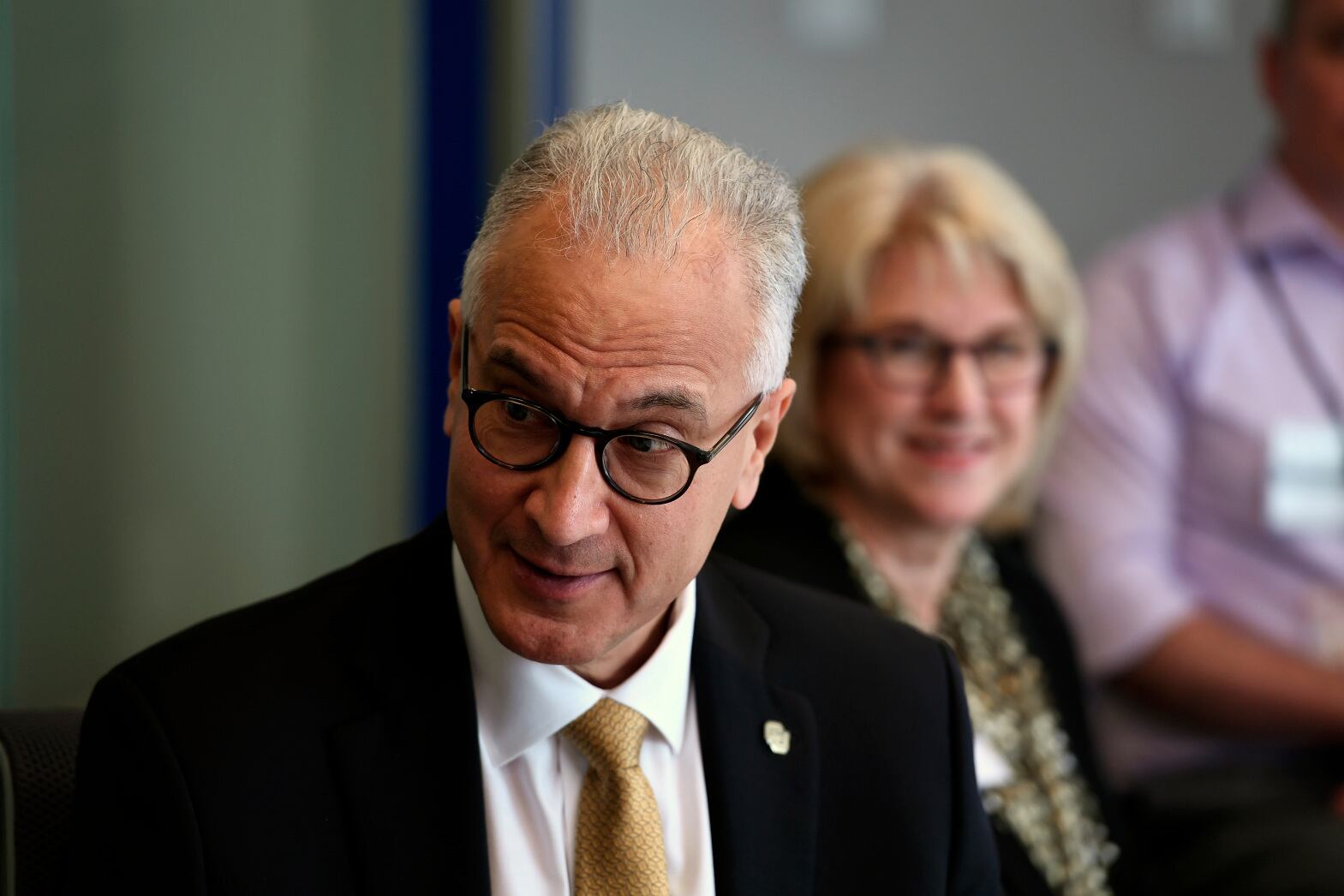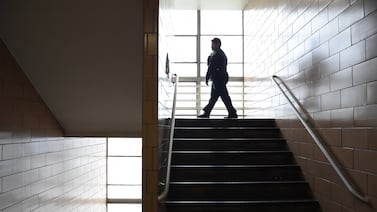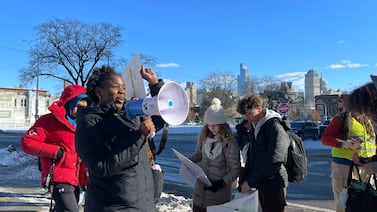After nearly two years bemoaning their president’s slow responses and missteps on critical issues, University of Colorado students — particularly those of color — are celebrating the early departure of Mark Kennedy. They see his exit as a chance to steer the system toward a more progressive track.
Faculty who censured Kennedy a month ago also expressed relief.
The University of Colorado Board of Regents will pay Kennedy $1.3 million to leave his post July 1, a year before his three-year contract expires.
Activist students are demanding the regents conduct a transparent search to find Kennedy’s successor and allow students to meet finalists and to have a say in the selection. They hope regents will identify a leader who listens to students’ varied perspectives, if not serve as an outspoken ally to their causes.
In his resignation message, Kennedy alluded to political pressures, saying the board has a new makeup this year that’s led to changes in focus and philosophy. Six months ago Democrats took control of the board of regents for the first time in half a century, after campaigning against his presidency.
Kennedy’s ouster comes as the nation has demanded leaders take more forceful action on racial issues. Observers say university boards across the country are seeking more active leadership on social, political, and economic issues confronting their students and the nation.
Students believe that Kennedy, a Republican and former president of the University of North Dakota, did not take up that mantle.
Instead, his comments frequently riled up University of Colorado students and, some students say, made life on the system’s four campuses difficult because his words maintained a culture that devalued people of color and others not in the mainstream.
The Boulder campus in particular, with a student body that is 67% white, is among the least racially diverse among public universities in the state and hasn’t always been seen as a welcoming place for students of color.
Daniel Casillas, University of Colorado Denver student body president, said Kennedy’s statements and actions clearly indicated he didn’t hold perspectives that aligned with the campuses.
The university system president, Casillas said, “doesn’t affect our day-to-day life as a student but he definitely impacts the environment of all four universities.”
In 2019 Kennedy was the sole finalist for the presidency, and regents appointed him on a 5-4 Republican majority vote. At the time, faculty, students, staff, and alumni protested, pointing to the former Minnesota Republican congressman’s history of voting against LGBTQ rights, although Kennedy said his stance on gay marriage has “evolved.”
Students said the university system under Kennedy did not adequately improve diversity, equity, and inclusion.
System spokesman Ken McConnellogue said Kennedy has focused on trying to make the campuses more inclusive, but that much of that work falls on campus leaders.
McConnellogue pointed to Kennedy’s accomplishments listed on the university’s website. They include: placing diversity, equity, and inclusion as a top goal in long-range plans; hiring diversity officers for the system and for each campus; securing $5 million for a diversity, equity, and inclusion fund; and working to ensure the University of Colorado Denver wins Hispanic-Serving Institution recognition.
“He would also say he made some statements he regrets,” McConnellogue said. “He apologized when appropriate.”
Kennedy once compared the consequences of not expanding online courses during the pandemic to the Trail of Tears, a flippant remark that drew rebuke from Native Americans. The Trail of Tears refers to the U.S. government’s eviction of Native American tribes from their homelands in the Southeast and the harsh journey on foot to the Midwest. Thousands died.
Students have also pointed out Kennedy’s slow reaction to national issues on race, such as the delay in responding to President Donald Trump’s attempts to force out international students, and Kennedy’s passing mention of the mass shooting in Atlanta.
The Boulder Faculty Assembly last month censured Kennedy for what members called his inability to lead on diversity, equity, and inclusion matters. The University of Colorado Boulder Student Government also censured him.
Holly Olivarez, a doctoral student who has pushed to create a more inclusive University of Colorado, said she feels “relief in knowing that a white male leader is being held accountable for his pattern of behavior.”
Sam Zhang, a graduate student, is thinking about the next president.
“I’m imagining a president that is out there campaigning for student debt relief and that proactively works with our union,” said Zhang, who serves on the United Campus Workers union steering committee.
It’s likely Democratic regents will want to bring in a leader who aligns with their political philosophy.
Kevin McClure, an expert at the University of North Carolina Wilmington on college leadership, said boards shouldn’t select presidents based on their politics because that plants the seeds of backlash from the losing side and makes it difficult for presidents to build trust.
“It’s a much better thing to be selecting people that are qualified, that have experience, that are familiar with public higher education and that have a strong record of public service,” McClure said.
That’s exactly what the previous majority of regents ignored, in appointing Kennedy over more broadly qualified candidates, critics say.
Many boards are looking for outspoken leaders, McClure said, but boards also tend to avoid risks and therefore favor prior leadership experience. That points to older white males, which might make it difficult for regents to find leaders qualified for tackling racial issues, he said.
Zhang said regents should consider a broader range of candidates instead of trying to maintain the status quo.
“I just want to resist that temptation to be satisfied with someone who’s not making racist comments every month or just expressing the most basic type of support for international students,” Zhang said. “That should all be given, and then we should be imagining what’s possible beyond that.”
Juan Ramirez, a doctoral student, also said he wants a more transparent process to find a leader who can create consensus. He said that under Kennedy many felt that decisions were forced upon them.
Some faculty believe Kennedy overstepped his role when creating an online education system last year without sufficiently consulting faculty about how students would be taught.
Kennedy disregarded faculty expertise and created friction, said Bob Ferry, a University of Colorado Boulder history professor and Boulder Faculty Assembly member.
“All the things we do know, our disciplines, and our ideas about society and how to build bridges and how to learn how to write and all that,” Ferry said, “it felt like it didn’t matter.”
Ferry said that Bruce Benson, Kennedy’s predecessor and also a Republican, spent 11 years as president and was never censured by the faculty, who lean progressive.
“We didn’t always agree politically, but President Benson knew enough, I’d say, to let the campuses operate,” Ferry said.
System spokesman McConellague counters the complaints about Kennedy’s leadership, saying the president frequently stressed that academic programming was the purview of faculty.
“He also listened to them and made course corrections following their suggestions,” McConellague said.
Casillas, CU Denver’s student body president, said he hopes for a president who understands varied perspectives and respects student diversity.
“What we’re really fighting for is someone that supports us, supports the work of diversity, equity, and inclusion and acknowledges their words and their history,” he said.







